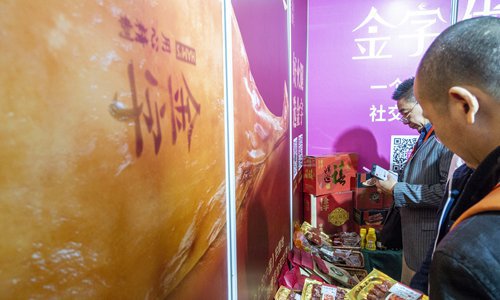
Photo: VCG
Artificial meat can't replace real meat in the short term as the technology isn't mature, although there's a need for it in the market amid food security and health issues, a Chinese expert said.
The comment came after Chinese food production company Jinzi Ham started to sell a box of four pieces (220 grams) of "beef" plant-based pie priced at 118 yuan ($16.6) on Tmall, Alibaba's online marketplace on Tuesday. The price was almost four times that of actual meat.
According to the Jinzi Ham flagship store on Tmall, there have already been almost 1,000 online orders.
However, some consumers have expressed doubts. On Sina Weibo, an internet user named "fangyangdewuxiaoer" said "It's too expensive. I will continue to have real meat." The post included a laughing emoji.
Another internet user named "houhoushengzhentian" complained about the high price, saying, "The meat is sold based on pieces [instead of weight]. It's healthier to have tofu."
Zhu Danpeng, a Guangzhou-based food industry analyst, told the Global Times on Wednesday that it's too early to talk about fake meat replacing real meat because the technology isn't mature.
"Given food safety concerns as well as consumer demand for healthy lifestyles, artificial meat has a certain market role. But the key problem is China doesn't have a complete artificial meat industry chain. It's a nascent sector at present," Zhu said.
Jinzi Ham announced pre-sales for the artificial meat product on Friday, sending its shares up by the daily limit of 10 percent on the Shenzhen Stock Exchange for three consecutive days.
On Monday, the company said its plant-based meat products have been granted a manufacturing license and production has started, according to a statement sent to the Shenzhen Stock Exchange. Jinzi Ham said that the main raw material in the artificial meat is plant protein extracted from soybeans, peas and grains.
The company developed the product with US-based DuPont's wholly owned China subsidiary Danisco to simulate the composition and structure of meat, making it similar to real meat in terms of nutrients and flavor, according to the statement.
In the wake of the soaring stock price, Jinzi Ham received a letter from the Shenzhen bourse on Tuesday, asking the company to explain its cooperation with DuPont and give more details about how much sales of the artificial meat will account for total income.
Jinzi Ham's stock price dropped 8.53 percent to 6.22 yuan on Wednesday.
Song Qinghui, an independent economist, said Wednesday that it's unreasonable for investors to chase the artificial meat concept, and that's led to producers' shares being overvalued.
"Considering the [high] price of Jinzi Ham's plant-based meat pie, it's hard to sell to average people," he said.
